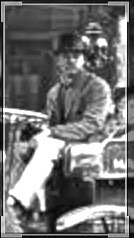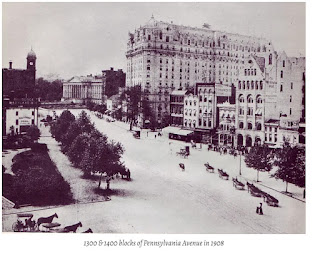 Albert Ernest Beitzell, a prominent merchant in the Nation’s Capitol, sold whiskey, soft drinks, seafood and theater seats in a career that contained a lifetime of unpredictable events, including witnessing a suicide. Nevertheless, Beitzell maintained his sense of humor, including advertising his whiskey with a red raven, a mythical bird of his own devising.
Albert Ernest Beitzell, a prominent merchant in the Nation’s Capitol, sold whiskey, soft drinks, seafood and theater seats in a career that contained a lifetime of unpredictable events, including witnessing a suicide. Nevertheless, Beitzell maintained his sense of humor, including advertising his whiskey with a red raven, a mythical bird of his own devising.
Albert was born in June 1869 in Wicomico, a community in the Northern Neck of Virginia, the northernmost of three peninsulas (traditionally called "necks" in Virginia) on the western shore of the Chesapeake Bay. His father Josiah Beitzell was 35 at his birth, his mother Mary Agnes (Weser) Beitzell was 33. Albert was their third child. Four more would follow. The 1870 census found the family in Wicomico where Josiah was working as a sailor, almost certainly on an oyster boat. Three oystermen in their early 20s boarded with the family.
As a youth Albert would soon become aware of the uncertainties of harvesting oysters from the Chesapeake Bay. Weather and water related developments can affect the oyster catch, often leaving the watermen “high and dry.” The 1880 census recorded the family having moved to Abell in St. Mary’s County, Maryland, still located on Chesapeake Bay. Josiah apparently had given up the waterman’s life and listed his occupation as “farmer.” Four years later he died at 50 years old, leaving behind five minor children. As a likely consequence Albert was forced to end his formal education after the 8th grade.
Mother Mary Agnes apparently was able to weather the loss of her spouse as her older children took employment. The family continued to live in Abell. Five years later, however, she died. Albert Beitzell was now an adult and on his own. Seeing more opportunities in the big city he moved to Washington D.C. There, likely with the help of friends in the seafood trade, he went to work as an oyster wholesaler. The 1900 census found him engaged in that occupation at 30 years old. Bietzell also had been married for one year to Mary Margaret Cumberland, 26, the daughter of a boathouse keeper on the Potomac River. The couple later would have two children, Louise and Albert Jr.
Beitzell’s rise as a D.C. merchant requires some speculation. At some point in the early 1900s he appears to have left wholesaling seafood, perhaps discouraged by the the variability of the oyster harvest. Instead he entered the liquor trade, a solid money-making occupation in Washington, D.C. as congressmen, government appointees, lobbyists, and political hangers-on provided a ready customer base for liquor stores and saloons throughout the Nation’s Capital. Beitzell’s signature label was “Red Raven,” featuring a mythical avian not seen in nature. He sometimes compounded the enigma with the puzzling slogan: “Ask the Man.” The brand proved to be popular.
 The success of his liquor house at 210 Tenth Street SW brought Bietzell to the attention of the city’s business elites. Among them was Harry Crandell, a local businessman who owned a chain of 18 theaters including the Apollo and others in Washington D.C. His venues also could be found in Baltimore, Martinsburg WV, and elsewhere. Shown here, Crandall struck a friendship with Beitzell that blossomed into a business relationship. The liquor dealer became vice president of Crandell’s theatrical corporation.
The success of his liquor house at 210 Tenth Street SW brought Bietzell to the attention of the city’s business elites. Among them was Harry Crandell, a local businessman who owned a chain of 18 theaters including the Apollo and others in Washington D.C. His venues also could be found in Baltimore, Martinsburg WV, and elsewhere. Shown here, Crandall struck a friendship with Beitzell that blossomed into a business relationship. The liquor dealer became vice president of Crandell’s theatrical corporation.
One result of Bietzell’s theater involvement was membership in the Washington Garrick Club, named for a famous British men’s club geared toward actors and others with ties to the stage. Located on the second floor of a building at 1347 Pennsylvania Avenue, the Washington Garrick Club had a similarly theatrical membership. Bietzell unexpectedly would find himself in the center of a drama that played out at the Garrick Club on the morning of July 1, 1907.
 As reported at length in the Washington Evening Star of that date, Bietzell was visiting the club that morning with Raleigh F. Luckett, the 27-year-old brother of a well-known local theater manager. Although seemingly in good spirits, Luckett was involved in a two month separation from his wife, Gertrude, who had left him and taken their two children. They greeted the club manager, E.S. Doughty, shown left, and chatted. Then Luckett excused himself. He said he intended to read a newspaper in the club’s front room.
As reported at length in the Washington Evening Star of that date, Bietzell was visiting the club that morning with Raleigh F. Luckett, the 27-year-old brother of a well-known local theater manager. Although seemingly in good spirits, Luckett was involved in a two month separation from his wife, Gertrude, who had left him and taken their two children. They greeted the club manager, E.S. Doughty, shown left, and chatted. Then Luckett excused himself. He said he intended to read a newspaper in the club’s front room.
The Star reported ensuing events: Those in the back room about five minutes later heard the report of a pistol….Mr. Beitzell, stepping into the front room, discovered young Luckett collapsed in his chair with a bloody wound in his breast and a smoking revolver in his hand. ‘It is all over. it is all over’…the wounded man gasped. ‘What did you do this for? asked Mr. Beitzell; but the only reply was, ‘It is all over.’
Beitzell and others summoned an ambulance. Luckett was rushed to a hospital where doctors thought there was a chance of saving him. The young man, however, was too badly injured and died shortly after. The liquor dealer never forgot the shock of seeing his young acquaintance so unexpectedly mortally wounded.
As the 20 Century moved forward Beitzell experienced another devasting event. Enacted by Congress, prohibition came to D.C. in 1917, three years before it was enacted into law nationwide. All legal bars in the District were ordered to be shut down. In a single day wholesale liquor dealers like Beitzell saw their customer base wiped out. But Prohibition didn't succeed in eradicating alcohol from the nation's capital. Instead, some 267 licensed saloons morphed into nearly 3,000 speakeasies, disguised in a variety of forms. Ostensibly Beitzell moved into selling soft drinks, near-beer, and fountain supplies. A favorite brand was “Checonia Evans.” When asked his occupation by a census taker in 1920, Beitzell told him “Temperance Manager.”

Was this truck used to haul bootleg liquor? Family lore tends to raise that suspicion without actual proof. Clearly Beitzell never lost his interest in “the hard stuff.” When it became clear that National Prohibition had been a gigantic mistake, expanding the drinking public and forcing the trade underground into criminal hands, he sensed Repeal coming and in the early 1930s began negotiations overseas to represent Johnny Walker Scotch and Bols Liquors from Holland in anticipation of the “dry” laws being terminated.
At this time Beitzell was living in a spacious home at 7316 Alaska Avenue, shown here. Still standing, the house and grounds are valued today at $1.2 million. His great grand niece, Christina, suggests that he suffered business reverses during Prohibition, had returned to the oyster trade afterward and was recovering his fortunes in the late 1930s.
About 1938 Beitzell suffered setbacks in his health and retired. He died in May 1942 at 72 years old, survived by his widow, Mary Margaret, and both children. Following a funeral Mass at the Church of the Nativity in Washington, he was buried in Mount Olivet Cemetery, honored as a 50-year resident of the District of Columbia, a member of the Association of the Oldest Inhabitants of Elk’s Lodge 15, and active in the Washington Aerie of Eagles. Mary Margaret would join him at Mount Olivet in 1952. Their grave stones are below.
Note: This story of Albert Beitzell was largely revealed on an internet site provided by his descendant, Christina, whose last name was not given. She also included the Evening Star report of the suicide. A variety of other sources provide other details of this Washington D.C. whiskey man.










No comments:
Post a Comment